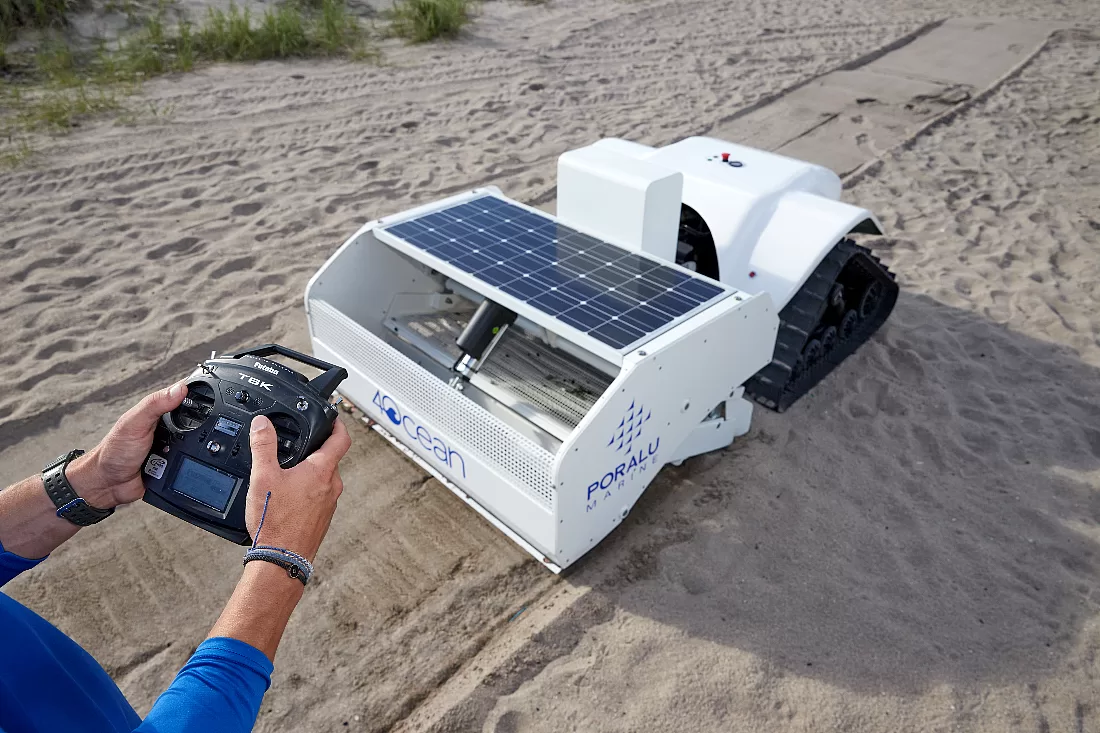Meet BeBot, The Beach-Cleaning Robot
BeBot enjoys a taste for plastic junk food and is looking for a home at the beach.
BeBot enjoys a taste for plastic junk food and is looking for a home at the beach.

Florida is famous for its sparkling blue waters and sugar-white sands. It has become a magnet for tourists, second homeowners, and retirees. But all those visitors, and a growing resident population, have sadly left more than footprints – there’s trash, and lots of it.
Much of the trash recovered from our beaches and waterways is plastic. Research suggests that each year, more than 14 million tons of plastic end up in the world’s oceans. And with global plastic production and consumption likely to increase by 400% over the next 30 years, a solution is desperately needed.
While bulky plastic trash – bottles, broken toys, straws, bags, food wrappers, and containers – leave our beaches looking dirty and polluted, it is the very smallest pieces, almost invisible to the human eye, that are the most dangerous. These toxic micro-plastic and nano-plastic beads and fragments are being ingested by marine mammals, birds, and fish and, potentially, through the food chain, on to us humans too.

While Florida’s counties and tourist development boards are busy trying to keep our beaches clean by hauling away bags of trash every day, there is still much more that needs to be done.
Local community groups, environmental campaigners, and 501(c)(3) organizations such as Keep America Beautiful are helping. Whether it is arranging charity clean-ups, protesting illegal dumping, or simply filling bags with rubbish during sunset strolls, we all have a part to play.
But with a coastline stretching for more than 1,350 miles, we need all the help we can get.
Step forward, BeBot. Or rather, roll forward. BeBot is a tank-track-wearing R2-D2 lookalike, solar-powered, remote-controlled, trash-eating robot.
According to its manufacturer, Poralu Marine, the BeBot can silently and discreetly clean up to 32,000 square feet of beach every hour depending on the topography. That’s the equivalent of seven basketball courts.
BeBot will sift the top layer of dry sand to capture small items – cigarette butts, bottle tops, food wrappers – often missed by volunteers and other beach cleaning efforts – though it does not dig too deep, avoiding disruption of natural habitat and wildlife.
And now, a new BeBot is on its way to Florida’s coast.

Keep Florida Beautiful, an umbrella organization of 40 local city and county affiliates, is set to receive a BeBot courtesy of Surfing’s Evolution and Preservation Foundation, a charitable organization founded by Ron and Lynne DiMenna, the duo behind the Ron Jon Surf Shop brand. Last year, Florida’s legislature provided $800,000 in funds to Keep Florida Beautiful. As a result, with the assistance of more than 90,000 volunteers state-wide, the organization’s local affiliates collectively removed more than three million pounds of litter from Florida’s natural environment in 2021.
“Our mission to keep Florida beautiful is simple but multi-faceted,” said Savanna Christy, executive director of Keep Florida Beautiful. “We hope BeBot will draw a lot of awareness and concern about the plight of our beaches and waterways, but we know it can’t replace the effectiveness of the armies of volunteers who keep our beaches clean.”
So next time you are on one of Florida’s wonderful beaches, keep an eye open for a BeBot near you. As it silently and methodically sifts through the sand, picking up trash and leaving our beaches in better shape than it found them, perhaps it can serve as an inspiration to you and your guests.
If BeBot could speak, I imagine it would say: “Don’t leave your litter on the beach, don’t chuck your empty bottles and containers off the side of your boat, and take the toys, deckchairs, and umbrellas back home with you when your vacation is over.”
BeBot may only just be starting its mission to help clean our oceans and beaches, but if residents and visitors changed their behavior now, I’m sure he would be happy to retire early.


